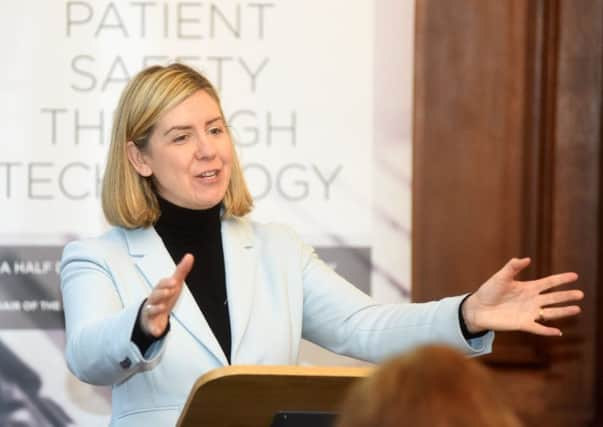In My View with Andrea Jenkyns MP: The true cost of medication errors


Sadly, my family are not an isolated case - recently I hosted a patient safety conference where I heard some devastating stories about the impact on all of those involved when things go wrong in our beloved NHS.
The conference in Westminster focussed on the impact of medication errors and bought together representatives from a number of leading hospital Trusts including Great Ormond Street Hospital (GOSH), pharmacy automation specialists Omnicell UK, Diabetes UK and the Royal College of Nursing to discuss ways in which we can work together to reduce such errors and help support our stretched NHS workforce. It attracted a number of attendees from different NHS Trusts and patient groups, who were able to put their questions to a panel.
Advertisement
Hide AdAdvertisement
Hide AdGuests heard some truly heart-breaking accounts of the real impact of medication errors including that of 51-year old lung cancer patient Phillipa, who despite warning healthcare professionals no less than six times of her allergy, was administered penicillin causing her to suffer a cardiac arrest and tragically pass away three days later in January 2014.
Her partner of 30 years Roy encapsulates perfectly the horror and true personal cost of these errors: “The impact on the family as a victim of a mistake is enormous – of having someone snatched away from you needlessly is appalling. We did not have time to say goodbye.”
A staggering 237 million medication errors occur every year in the UK, causing 712 deaths. The sheer number of patients and the ever-increasing complex regimes of our population is creating a perfect storm. Within hospitals, 78 per cent of errors occur in secondary care during the administration process. The World Health Organisation recognises the impact of the problem and has committed to a 50 per cent reduction of harmful medication errors by 2022.
While the conference agreed there was no one magic fix to reduce these errors, there was agreement in the room that much could be done now to allow us to start heading in the right direction.
Advertisement
Hide AdAdvertisement
Hide AdThis includes a move towards ‘closed loop prescribing and administration’ where automation and software is integrated within hospitals to ensure the right patient is administered the right dose of the right drug at the right time.
Paul O’Hanlon, Managing Director of Omnicell UK&I went on to say such solutions were already available and explained how Omnicell was campaigning for the ‘closed loop’ approach to become a standard of care across the UK having seen the benefits in a number of NHS Trusts.
Another important area of focus was around learning from mistakes, rather than creating a culture of blame and safe staffing levels.
Yinglen Butt, Associate Director of Quality and Regulation at the Royal College of Nursing gave a passionate speech outlining the impact of medication errors on the nursing profession.
Advertisement
Hide AdAdvertisement
Hide AdApproximately 40 per cent of nurses’ clinical time is spent on administering medications, translating to 12-16 hours in any given working week. The workforce impact of these medication errors is monumental, including psychological trauma, loss of confidence, disciplinary action and in a few extreme cases, even suicide. Nurses are the ‘second victims’ of these tragedies.
Yet, to even contemplate moving forwards and adopting learnings, there needs to be a cultural shift and change regarding the improvement of medication error reporting without fear of repercussions.
There was consensus among those in the room that the NHS needs to get better at sharing best practice and the need to put in place a one system approach.
Steve Tomlin, Chief Pharmacist at Great Ormond Street Hospital, discussed how the National Health Service needed to be more ‘national’ by reducing variation and standardising systems to drive patient safety forward. He explained that embracing technology was part of that as it is ‘putting the rationalisation into decision making’.
Advertisement
Hide AdAdvertisement
Hide AdAt Great Ormond Street medication administration cabinets are already in situ on a number of wards making it easier to locate and select the right medication for the right patient quickly.
They now plan to improve patient safety and ensure nurses have more time at the bedside with patients, by rolling out these cabinets to every ward by the coming summer and integrating them with electronic prescribing to ‘close the loop’.
Medicine and nursing is a safety critical industry. Patient safety is so important - behind every statistic is someone’s life, it is always someone’s son, someone’s father, someone’s daughter.
That’s why we need to continue to work together and speak openly to find a way to reduce the risks of mistakes being made and to learn from them for the future.
Andrea Jenkyns is the Conservative MP for Morley and Outwood.